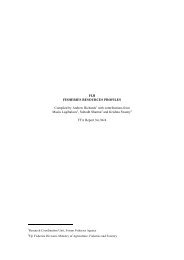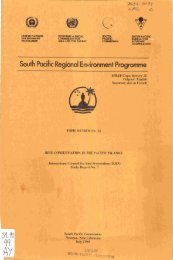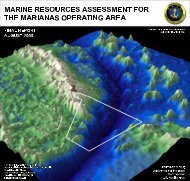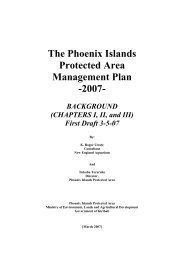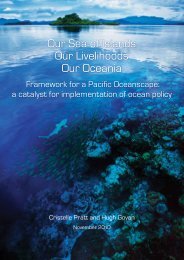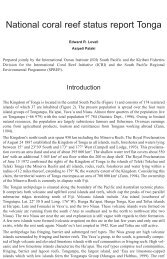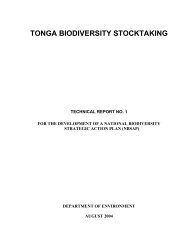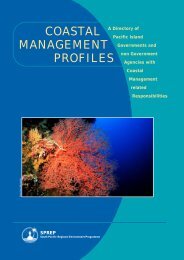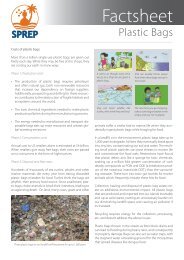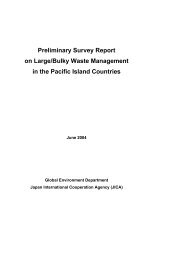KINGDOM OF TONGA - SPREP
KINGDOM OF TONGA - SPREP
KINGDOM OF TONGA - SPREP
Create successful ePaper yourself
Turn your PDF publications into a flip-book with our unique Google optimized e-Paper software.
Strategic Development Plan 8 2006/07-2008/09<br />
management for sustainable resource utilization. The Aquaculture Act provided<br />
for the environmentally responsible development of aquaculture.<br />
Under existing legislation, sales of agricultural commodities remained free<br />
of income tax, except where a company structure was in place, in which case<br />
company tax was payable. Agricultural inputs continued to be free of import<br />
duty, and in June 2005 were exempted from consumption tax and subject to a<br />
zero rate. Tax expenditure allowed under Development Licenses is shown in<br />
Table 1.1.<br />
The Ministry of Agriculture, Food and Forestry reviewed its<br />
organizational structure and decided to refocus on the core functions of research<br />
and extension, market information, regulation and quarantine. An Institutional<br />
Strengthening Program aimed at improving service delivery in these core areas,<br />
while the Ministry withdrew from commercial activities such as ‘Eua Forestry<br />
and the Machinery Pool. This reorientation was encapsulated by the Ministry’s<br />
provision of the initial research, extension and development inputs for the<br />
fledgling coffee industry, before transferring the activity to the private sector for<br />
full commercial development. Notable projects included the recommissioning of<br />
the High Temperature Forced Air facility at Fua’amotu Airport, which will allow<br />
the export of breadfruit, tomatoes, capsicum, eggplant and pawpaw to New<br />
Zealand. The Government also invested in two blast freezers, which will preserve<br />
the quality of individual growers’ root crops.<br />
In 2005, a separate Ministry of Forestry was created, leaving a Ministry of<br />
Agriculture and Food. The combined budget allocation for these ministries in<br />
2005/06 was $5.3 million, or 3.0% of the total budget.<br />
In the fisheries sector, individual producers are, like agricultural<br />
producers, exempt from income tax. Additionally, sector development was<br />
promoted by the establishment in February 2000 of a fuel concession scheme for<br />
fish exporters, which has been monitored by a fuel concession committee chaired<br />
by the Secretary for Fisheries. Table 1.1 shows the magnitude of the tax<br />
expenditures involved in recent years.<br />
The Ministry of Fisheries focused on ensuring the sustainable<br />
development of fisheries. The Fisheries Management Act 2002 and the<br />
Aquaculture Act 2003 already have been mentioned, with both requiring drafting<br />
and approval of regulations before they can become effective. In June 2001 the<br />
Tonga National Tuna Management and Development Plan was released, the key<br />
objectives being sustainability of resource use and realization of benefits to<br />
Tonga from the exploitation of tuna resources. The Plan is managed and<br />
monitored by the Tuna Management Committee, which includes Government<br />
representatives, non-government organizations and private sector<br />
representatives. Throughout 2000-2005, the Ministry of Fisheries received<br />
substantial support through an AusAID-financed project, though<br />
Looking to the Future, Building on the Past 10



